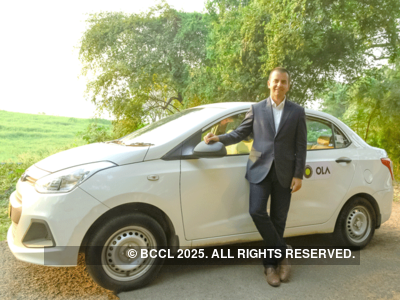- News
- Business News
- Startups News
- Bumpy ride for Ola & SoftBank as Bhavish Aggarwal drives along with new investors
Trending
This story is from March 26, 2019
Bumpy ride for Ola & SoftBank as Bhavish Aggarwal drives along with new investors
Cab aggregator’s new investor group distances Ola further from its biggest stakeholder SoftBank as merger with rival Uber goes off the table.

Ola’s relationship with its largest and most powerful investor has been fraught with ups and downs. As things stand now, the Uber-Ola merger proposal is off the table.
(This story originally appeared in on Mar 26, 2019)
Last month, SoftBank Vision Fund chief Rajeev Misra gathered his India portfolio companies’ founders into a huddle. They were to meet the head of Saudi Arabia’s Public Investment Fund, Yasir Al-Rumayyan, and also get a quick introduction to the Saudi crown prince Mohammed bin Salman, who was on a state visit to India. Saudi PIF has committed $45 billion to the Vision Fund.Founders of Paytm, Oyo, Grofers and Delhivery had lined up for the meet-and-greet at a swish hotel in New Delhi.

Aggarwal, who has been rallying support for his company by mopping up funds from investors such as Steadview Capital, Flipkart cofounder Sachin Bansal, Singapore’s sovereign fund Temasek and a clutch of smaller Chinese funds, recently roped in South Korean Hyundai and its affiliate Kia Motors.
This is a strategic partnership, Ola said last week in its official announcement. The two companies will collaborate to develop fleet and mobility solutions, build India-specific electric vehicles and infrastructure as well as explore opportunities and offerings for driver partners with customised vehicles.
While these investments haven’t been as large as what SoftBank would have offered to Ola, they have given the company enough ammunition to keep fighting in the market, expand internationally, and most importantly develop mobility solutions instead of being dependent on simply aggregating cabs on its platform. Ola also racked up Rs 400 crore for its electric mobility project from Tiger Global and Matrix Partners recently. More importantly, this group has become an ally of Aggarwal in his fight to keep control of his company, with new investors like Temasek agreeing to vote with the founders on key issues.

THE BEGINNINGS
In October 2014, SoftBank invested $210 million in Ola. It was a significant endorsement for Ola cofounders Aggarwal and Ankit Bhati as their scrappy startup was now part of the unicorn club of privately-held companies valued at $1 billion or more. The timing coincided with rival Uber’s aggressive plans in India. Both the cab aggregators burnt as much as $300-400 million in 2015-16 in a bid to woo consumers and driver partners.
Early in 2015, the third player in the taxi-hailing market, TaxiForSure (TFS), was up for grabs as it became tough for it to survive the Ola-Uber onslaught. It was acquired by Ola in a $200 million stockcash combined deal. TFS saw its investors such as Accel Partners, Helion Venture Partners and others get a small share in Ola. But cash-burn didn’t stop with the merger.
Sometime at the end of 2016, SoftBank made an offer to invest $1 billion in Ola at a reduced valuation of $3 billion, down from $5 billion in its previous round. Ola didn’t agree to the offer and only took $250 million in the down round.
This was the beginning of the chasm between SoftBank and Aggarwal which widened further after SoftBank became the largest investor in Uber in December 2017. The Japanese investor mooted the idea of a merger of Ola with Uber’s Indian operations, although it was not clear who would be the dominant party in such a merger. Around the same time, SoftBank sought to corner a larger share in Ola by acquiring Tiger Global’s stake in the company.
Aggarwal was opposed to both these moves and was particularly peeved by the Japanese company’s bid to buy Tiger’s shares without informing him. To ward off such a possibility, he changed Ola’s articles of association and gave himself the right to veto any share sale among investors. Simultaneously, he put in place a special purpose vehicle to raise funds from new investors.
Last year, Tiger cashed out partially through Sachin Bansal, who invested $92 million in Ola.
FUTURE CHALLENGES
Ola’s relationship with its largest and most powerful investor has been fraught with ups and downs. As things stand now, the Uber-Ola merger proposal is off the table. While SoftBank is still the largest shareholder in Ola, with a 26% stake, it isn’t keen to pump any further capital in the transportation startup, which was last valued at around $6 billion. Aggarwal too appears determined to sustain his company without future SoftBank funding. For now, he has managed to diversify the company’s investor base and rope in new shareholders. His international foray is still to be tested and the wager on food-delivery through Foodpanda hasn’t really materialised into anything meaningful. In fact, to prune costs, its food-delivery initiative has been put on the backburner. A foray into financial services also appears in the offing. But his key challenge is to make his core business viable in the near future so that it doesn’t need constant investor capital.
(This is a modified version of a blog post which first appeared on ETTech-.com. The full post can be read on the website)

About the Author
Samidha SharmaEnd of Article
FOLLOW US ON SOCIAL MEDIA














